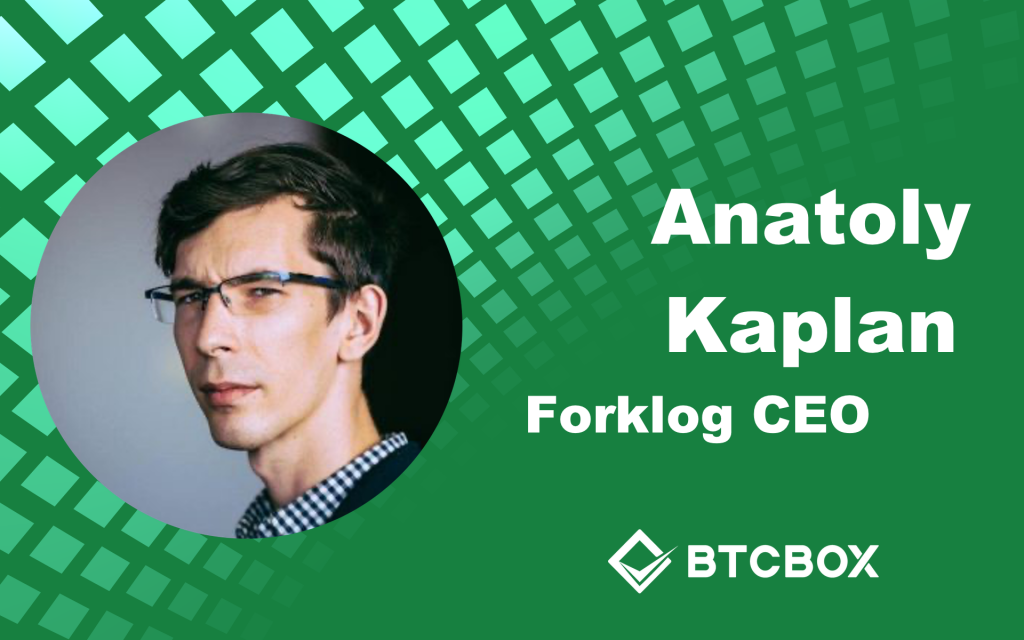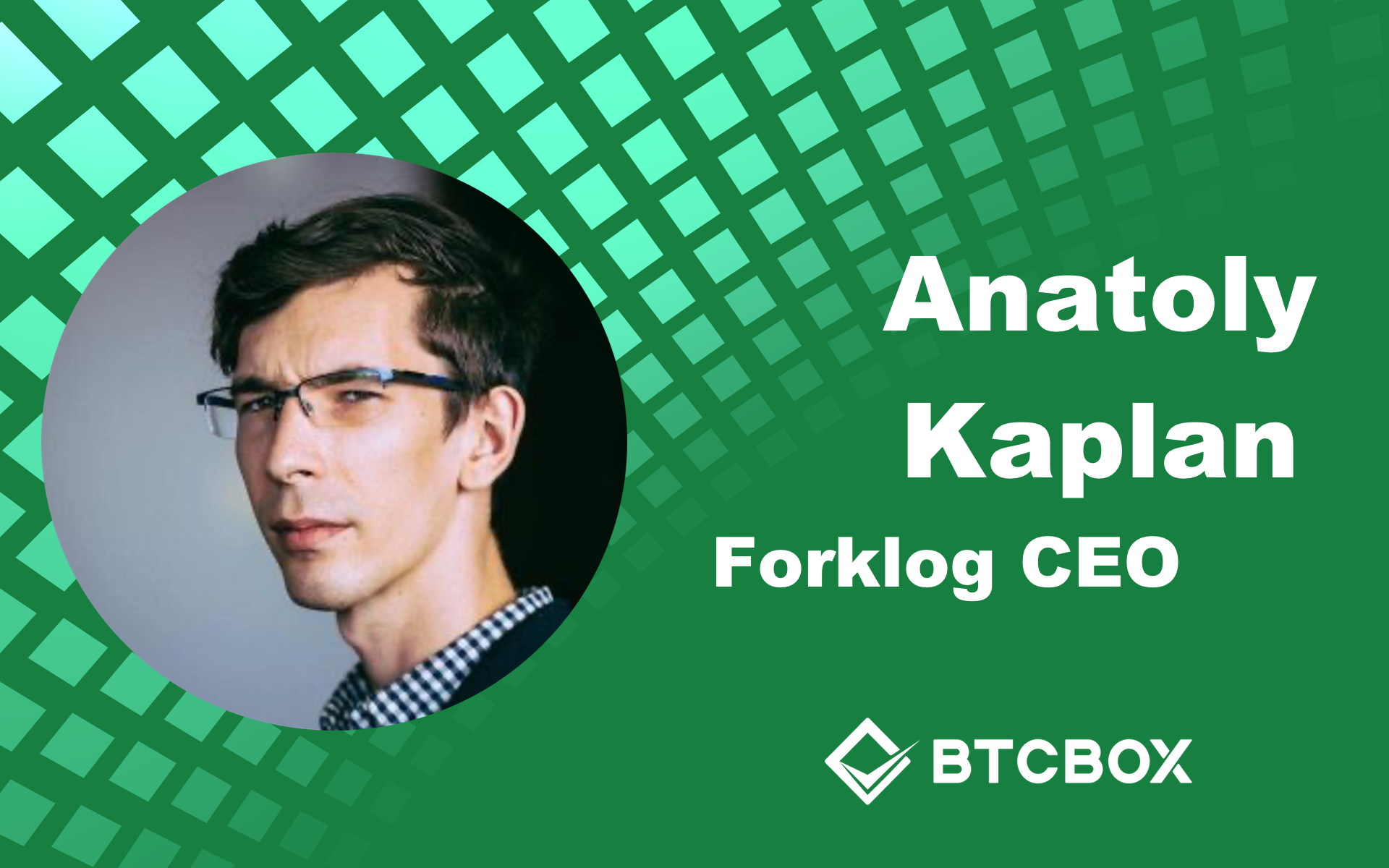
Anatoly Kaplan (also known as Tony Kaplan) is the CEO of Forklog, is the biggest cryptocurrency media in the Russian Community. The Forklog Team has gone through thick and thin to be a media that brings news, reviews, investigation, and crypto education to the Russian crypto community, regardless of harassment from different authorities in the Russian speaking regions.
Anatoly Kaplan(Forklog CEO)
Interview Date : 28th September 2020
My name is Anatoly Kaplan, and I am the CEO of Forklog that is a crypto media company that covers the crypto market for the Russian speaking crypto community in countries where people speak the Russian language. We have been operating since 2014, it has already been 6 years since we started. In the beginning, we also had another department at a separate company that focused mostly on consulting and marketing, but after a while, we closed it. We are mostly focusing on content production including video content, special projects, etc.
Scope of Russian Crypto Community
The first thing you need to understand about the Russian crypto community is that it is not only Russia. When we refer to the Russian crypto community, we are talking about Russia, Ukraine, Belarus, which are the main countries, as well as other Russian speaking regions like Kyrgyzstan and Kazakhstan, Azerbaijan, Estonia, Georgia, Latvia, Lithuania, Moldova, Tajikistan, Turkmenistan, and Uzbekistan. These countries have a lot of historical connections. Sometimes, a reference to “Similarity” may harm or trigger some people due to political reasons. So, the Russian crypto community includes the countries that in any way are affected or involved with Russian culture.
The most active crypto communities are in St. Petersburg, Moscow, and Kyiv. It is also very active but very different from Moscow’s community. Belarus is also described as a very active region, especially now due to the political and economic turbulence that is going on in the country. Its economy got disrupted after the protest began. So, people are looking for opportunities just to save money because banks don’t give them cash or credit. The banks don’t have cash, so you can’t buy US dollars in Belarus right now as we talk. You have to wait until someone sells their US dollars for you to be able to buy. This extreme situation is only in Belarus as of now, and that has happened due to protests and incoherence between the government and the opposition.
Politicians Take on Crypto
Today’s politicians mostly ignore crypto. They look at it as a mere tool for games, high-risk apps, or businesses. Several sectors are responsible for creating law and regulation, but still, the status of Cryptocurrency is very ambiguous. They are on the assumption that it is a risky tool and that cryptocurrencies have to be controlled somehow. Most of the regulations concerning cryptocurrencies and digital assets began in 2015. That is when they created the Digital Financial Asset Act (DFA). Thus, when I read the article “Russia is finally legalizing Crypto”, it was not something new to me. Most of those articles have such titles only to get more clicks. Such articles have been on the internet since 2015. What happened recently, in summer 2020, was that the DFA was revised. However, most of the parts of the previous DFA remained the same, and not much has changed. I would not be surprised if the regulators would postpone the actual implementation of the act. First, the government wanted to ban it, then they legalized it, and now they are trying to ban miners from receiving BTC, so it is in a messy state. I believe it is easier for them to have crypto in a grey zone. They have much going on in their cabinets, so they don’t want to deal with it at the moment, as it is not a priority for them.
I think there is more freedom in the Russian crypto community when it comes to the degree of how much it is regulated. I have lived in Switzerland, Estonia, and Germany, so I know Europe well. In Switzerland, the situation is good for Bitcoiners, and you even have Bitcoin ATMs, where you can withdraw swiss franc without any KYC, and that’s all cool and good. However, I think it is too regulated, and it is affecting the decentralization part of crypto. You have to pay taxes, and there is a lot of attention from the authorities. In Russia, because the DFA act is not regulating the community as heavily as it does in Switzerland, for example, I think it’s giving us more space. People are trying out different ideas. However, that becomes more difficult if what you are doing is related to corruption. As long as you are not involved in that, then you are just fine.
Russian Crypto Influencers
Tone Vays is a famous trader, but traders can have a good and bad reputation. People either like them or not. There are several prominent influencers in the Russian community like Mike Chobanian who is the CEO of Kuna Exchange, and Sasha Ivanov who founded Waves in 2016, which is a global blockchain platform. I think Sasha Ivanov is one of the most successful people in the space from Russia. From a more global perspective, CZ from Binance is very popular among Russian Bitcoiners as well.
Where Are the Exchanges in Russia?
Most of the exchanges are handled through P2P deals within the country. As of now, there still is no legal framework to operate a cryptocurrency exchange in Russia. You can try to set up an exchange in Russia, but you won’t find any Banks that will support you. Despite this, if you still would create an exchange, you don’t know what is legal and not, so it’s just impossible to operate. There might be exchanges on the dark web that are operating illegally, however, most real Bitcoiners are critical thinkers and have some experience. They know that it is best to be in a real market and to ensure security from actual foreign exchanges. Most of the traders are active on foreign exchanges. Some Russian exchanges operate mainly for the Russian community, but they are located in other countries like the UK which has a legal framework to operate an exchange. At such places, most of the employees are Russians as well. Such places are gradually increasing.
I had several discussions with the people who were involved in implementing the DFA act. The new version of the DFA is not going to work, because it is incompetent. In the newly revised act, they want to restrict miners from accepting cryptocurrencies as a reward for their work. So, you can operate as a miner, but your reward cannot be in cryptocurrency. As you understand, the ones who are supposed to create this framework know very little about the industry, and they lack technical expertise. The government is, like in many other countries, a bit conservative. They don’t know how it works, how it is traded, or how to invite technical and market experts to create those laws and structures.
From a Blog to a Crypto Media
Forklog is legally a European company and we don’t have any problems accepting crypto legally. It was tough to set up all this and create the structure in the beginning, but we were able to do it. Nevertheless, we are always watching out for the Russian regulator. Since we do video content and post videos with crypto material on the internet, we have to be extra careful with new internet regulations that might arise.
Telegram and Russia Fight
There was a dispute between Telegram and the Russian regulators which started in 2018. Due to that, the Russian government blocked Telegram. In response, telegram started to look for technical solutions for its users. Telegram users saw the efforts Telegram was making for the users, so they started supporting telegram. A proxy was run for free for Telegram against what the government wanted to achieve. As a result, Telegram was blocked for several hours by the government. They blocked everything that was linked to telegram including Amazon and other big platforms. What the governors didn’t know was that, by blocking such huge internet services, it would affect the government network as well. They did not have any idea that this infrastructure was also related to government services. This all happened only because they wanted to block Telegram. Ultimately, all the government attempts were not fruitful, and they had to step back, reviving everything back to normal. As there is always something going on with regulators and the government structures, Russian people feel comfortable about crypto and are a little carefree about it.
Interviewer , Editor : Lina Kamada
【Disclaimer】
The Article published on this our Homepage are only for the purpose of providing information. This is not intended as a solicitation for cryptocurrency trading. Also, this article is the author’s personal opinions, and this does not represent opinion for the Company BtcBox Co.,Ltd.


